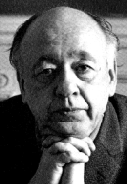|
 Born in Slatina,
Romania on November 13, 1909, Eugène Ionesco grew up in
France, but returned to Romania with his father after his parents
divorced in 1925. He studied French Literature at the University
of Bucharest from 1928 to 1933. In 1936, he married Rodica Burileanu.
He and Rodica had one daughter for whom he wrote several unconventional
children's stories. Ionesco and his family lived in Marseilles
during World War II, then settled in Paris after its liberation
in 1944. Born in Slatina,
Romania on November 13, 1909, Eugène Ionesco grew up in
France, but returned to Romania with his father after his parents
divorced in 1925. He studied French Literature at the University
of Bucharest from 1928 to 1933. In 1936, he married Rodica Burileanu.
He and Rodica had one daughter for whom he wrote several unconventional
children's stories. Ionesco and his family lived in Marseilles
during World War II, then settled in Paris after its liberation
in 1944.
Ionesco did not write his first play until 1950. Having decided
at the age of 40 that he ought to learn English, Ionesco acquired
an English text and set to work, conscientiously copying whole
sentences from his primer for the purpose of memorizing them.
Rereading them attentively, he learned not English but some astonishing
truths--that, for example, there are seven days in the week,
something he already knew; that the floor is down, the ceiling
up, things he already knew as well, perhaps, but that he had
never seriously thought about or had forgotten, and that seemed
to him, suddenly, as stupefying as they were indisputably true.
As the lessons became more complex, two characters were introduced,
Mr. and Mrs. Smith. To Ionesco's astonishment, Mrs. Smith informed
her husband that they had several children, that they lived in
the vicinity of London, that their name was Smith, that Mr. Smith
was a clerk, that they had a servant, Mary, English, like themselves.
What was remarkable about Mrs. Smith, was her eminently methodical
procedure in her quest for truth. But then, as Ionesco would
later write, "A strange phenomenon took place. I don't know
how--the text began imperceptibly to change before my eyes. The
very simple, luminously clear statements I had copied so diligently
into my notebook, left to themselves, fermented after a while,
lost their original identity, expanded and overflowed. The clichés
and truisms of the conversation primer, which had once made sense
... gave way to pseudo-clichés and pseudo-truisms; these
disintigrated into wild caricature and parody, and in the end
language disintigrated into disjointed fragments of words."
Ionesco set about translating his experience into a play,
The Bald Soprano, which was staged by Nicolas Bataille
on May 11, 1950, at the Noctambules. The Bald Soprano
went unnoticed, however, until a few established writers and
critics (Jean Anouilh, Raymond Queneau, and Jacques Lemarchand)
saw the play and supported it publicly. Their campaign to attract
an audience for the play succeeded and the middle-aged Ionesco
soon found himself in a position of international renown. He
went on to write more than twenty plays including Rhinoceros,
The Chairs, Jack or The Submission, The Lesson, The Killer, Exit
the King, Macbett, and Journeys Among the Dead.
Ionesco rejected the logical plot, character development,
and thought of traditional drama, instead creating his own anarchic
form of comedy to convey the meaninglessness of modern man's
existence in a universe ruled by chance. His awards include the
Tours Festival Prize for film, 1959; Prix Italia, 1963; Society
of Authors theatre prize, 1966; Grand Prix National for theatre,
1969; Monaco Grand Prix, 1969; Austrian State Prize for European
Literature, 1970; Jerusalem Prize, 1973; and honorary doctorates
from New York University and the universities of Louvain (France),
Warwick (England), and Tel Aviv (Israel). He was elected into
the Académie Française in 1970.
|